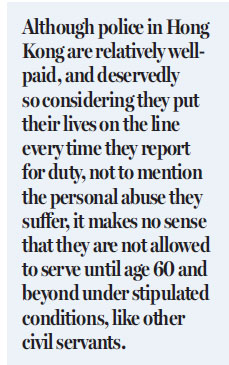We should respect the police for the tough job they do
Updated: 2017-03-16 09:33
(HK Edition)
|
|||||||||
Hong Kong's highly professional police force, known for many years as "Asia's Finest", has recently come under unprecedented attack. Following sentencing of the so-called "Seven Cops" to two years in jail for beating up an abusive activist during the 2014 "Occupy Central" street protests, over 30,000 officers staged a huge public display of support that raised eyebrows in the city. While most agree that it was essential for the rule of law for these officers to be found guilty, many feel that their sentences were unduly harsh compared with the mild sentences many "Occupy" protestors received for their unruly behavior. However, the real issue is not the seven officers but police morale which has taken a serious beating over the last two years.
The Hong Kong police are caught between a rock and a hard place. While their firm hand is universally recognized as essential for maintaining law and order in the present highly charged political atmosphere, they are wedged between the establishment and disgruntled protesters. Although their primary role is to protect life and property, the police might also be viewed by some as a political tool of the government. In a society polarized by political differences, police have the unenviable task of keeping the peace while at the same time maintaining strict political neutrality. If they enjoy the public's respect then they might be able to achieve this goal, but respect for our police seems to be in decline, which is why there have been calls to make it an offense to insult police officers.

Frankly, it is not surprising that our police feel persecuted. They have had an extremely hard time over the last few years given the pressures of "Occupy Central" and the Mong Kok riots. The last time the police came under similar pressure was during the 1967 disturbances. In most societies, the police tend to be the main point of contact between the government and the people. Yet in the last few years, social and political conflicts have put the police in an exposed and vulnerable position. What happened to the district officers, whose traditional role was to explain government policy and reflect public opinion? I seemed to recall having done a fair amount of conflict reconciliation work while a district officer and I wonder why my successors couldn't have carried on.
Another issue is the loss of respect for authority in general and the police in particular which has developed over the last few years as highly regarded institutions lose public respect due to the rise of social media. Peaceful protest is being gradually replaced with violence and abuse - and yet some officers think that wearing body armor in public places should be banned as it might project an image of alienation. We know that young people are angry about the lack of attractive career options and the unaffordability of homes. There is also the perception that violent protesters and rioters are treated with kid gloves by the courts while police are held accountable for every infraction.
While the police were generally restrained and professional during the "Occupy" protests, some members of the public and media think that the use of tear gas was unnecessary. By contrast, it was needed in the violent Mong Kok riot - and irritating gas is obviously a safer option than use of batons or firearms. Our police are also models of self-restraint compared to their US counterparts, who tend to have a "shoot first and ask questions later" attitude.
Another problem with our police force, according to some officers who spoke on condition of anonymity, is its over-cautious leadership, fearful of causing accidental civilian casualties which would then lead to a media field day of police bashing. However, police should be prepared for worst-case scenarios.
Although police in Hong Kong are relatively well-paid, and deservedly so considering they put their lives on the line every time they report for duty, not to mention the personal abuse they suffer, it makes no sense that they are not allowed to serve until age 60 and beyond under stipulated conditions, like other civil servants. Our brightest job seekers cannot help but hesitate in choosing law enforcement as a lifetime career knowing that they will be forced into retirement while still in their prime. The government needs to take into account the significantly improved health and longevity of the current generation, although an older retirement age might be less popular with younger serving officers due to perceived slower promotion prospects. The latter concern, however, can be addressed by giving promotion priority to promising younger officers.
Our police deserve the support of all sections of Hong Kong's community. Society should treasure the police force as a cornerstone of our social stability and accord it the support it deserves.
The author is a retired senior civil servant of the SAR government, having served in various bureaus and departments, including the police.
(HK Edition 03/16/2017 page9)